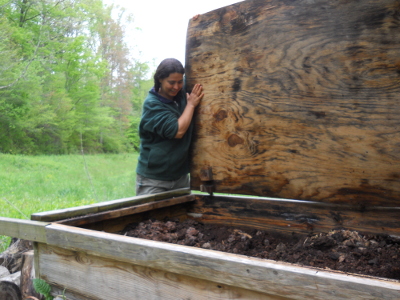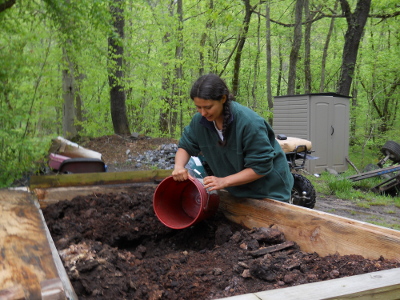
Cleaning out the worm bins
 Last spring, we
harvested 9 buckets of worm castings from the bin at the parking area (but figured the yield was
only two net buckets since we'd initially seeded the bin with 7 buckets
of worms plus mostly-composted castings). This year, we got 6
buckets of excellent castings out of that bin. If we'd been
desperate, we probably could have harvested another 4 or 5 buckets, but
I figured castings that are still full of worms were best pushed to the
side to seed the next year's crop. There is also about a quarter
of a bin of uncomposted manure that I'll add to the worm side before
filling the rest of the bin back up with manure in preparation for next
year's crop.
Last spring, we
harvested 9 buckets of worm castings from the bin at the parking area (but figured the yield was
only two net buckets since we'd initially seeded the bin with 7 buckets
of worms plus mostly-composted castings). This year, we got 6
buckets of excellent castings out of that bin. If we'd been
desperate, we probably could have harvested another 4 or 5 buckets, but
I figured castings that are still full of worms were best pushed to the
side to seed the next year's crop. There is also about a quarter
of a bin of uncomposted manure that I'll add to the worm side before
filling the rest of the bin back up with manure in preparation for next
year's crop.
Meanwhile, I delved into
one of the closer-to-home worm bins, and was delighted to see much more
worm action than I'd
reported in early spring. I now think that the
issue with these bins was partially lack of water (which I've since
corrected by leaving the lids open during a few storms), but was also
simply lack of time. Seeding
worm bins in early fall doesn't give the worms time to do much
before winter puts activity on hold. In addition, I think that
worm bins get better after they've been in place at least one summer
and have accumulated all of the partner microorgnisms and invertebrates
that pre-digest manure for the worms. The parking-area worm
bin certainly has a much more diverse array of inhabitants, with my
harvest turning up hatched snake eggs, black soldier fly exoskeletons,
and an array of unidentified critters.
 The castings from the parking
area bin are all going to potted plants --- topdressing the citrus and
potting up seedlings and cuttings. In a perfect world, I'd leave
the close-to-home bins alone since the worms are laying eggs and will
soon be experiencing a population boom. However, I need that aged
manure for the garden, so I'm carefully shoveling out the untouched
manure and pushing the worms (and eggs) to one end, then we'll fill
these bins back up once the floodplain is in shape for hauling manure
in. If all goes well, by this time next year, we'll have at least
24 buckets of worm castings to spread around the farm.
The castings from the parking
area bin are all going to potted plants --- topdressing the citrus and
potting up seedlings and cuttings. In a perfect world, I'd leave
the close-to-home bins alone since the worms are laying eggs and will
soon be experiencing a population boom. However, I need that aged
manure for the garden, so I'm carefully shoveling out the untouched
manure and pushing the worms (and eggs) to one end, then we'll fill
these bins back up once the floodplain is in shape for hauling manure
in. If all goes well, by this time next year, we'll have at least
24 buckets of worm castings to spread around the farm.
Want more in-depth information? Browse through our books.
Or explore more posts by date or by subject.
About us: Anna Hess and Mark Hamilton spent over a decade living self-sufficiently in the mountains of Virginia before moving north to start over from scratch in the foothills of Ohio. They've experimented with permaculture, no-till gardening, trailersteading, home-based microbusinesses and much more, writing about their adventures in both blogs and books.
Want to be notified when new comments are posted on this page? Click on the RSS button after you add a comment to subscribe to the comment feed, or simply check the box beside "email replies to me" while writing your comment.

Have you ever harvested green waste from local markets or restaurants for the worm beds?
Also, how many worms do you have by now in your bins? Could you harvest them to make new bins or add them to your humanure?
Gerry --- If you flip back through the posts tagged worms, you'll read all about our failed project of collecting food scraps from our local middle school. We drew a blank finding other establishments nearby that would let us take their food scraps --- our local grocery store, for example, has a policy that all food waste has to go directly in the dumpster.
Hard to say how many worms we have. The parking area bin (the oldest) has about a quarter of its area completely filled with worms, which is the perfect amount for seeding new material for the year ahead. The younger bins have more like an eighth or sixteenth of their area filled with worms, but those populations will grow. I could definitely harvest worms from the parking area bin to seed new bins, but wouldn't want to take any worms from the younger bins until at least next year.
I also wouldn't want to add the worms directly to the humanure since it would probably get too hot. Once we move on to bin two in the composting toilet, though, we could seed bin one.
Anna,
Right now I'm doing a 5-gallon worm bin in my kitchen with just kitchen scraps since I don't have a better place to put them (i.e., no chickens). Since I've only added paper and chopped up scraps, I know that all the dirt I'm pulling out of there is from the worms.
With your bins, how much do you think the worms are doing, and how much do you think is just the organic matter composting as if it had no worms in it? Is the make-up of the inputs different so maybe it wouldn't compost well sans worms? I'm just curious about the production and function is of a bin that big as compared to an under-the-sink one like mine. I also only have about a pound of worms (though, they've been eating like crazy, so it might be a little more than that now... I haven't seen any eggs, but I haven't really looked yet, either).
Is it clear that the castings you've used are helping? Are you only harvesting them once a year? Argh! I have so many questions...
Stephen --- You might be interested in this post about the technical side of worm castings versus compost. You can definitely tell the difference between castings and microbially-created compost because castings tend to be in little pellets when you look up close. I'm pretty sure that pretty much all of the output of this bin is castings.
That said, those castings could be from black soldier flies (in fact, I think up to half of the output of our bin this year was), beetles, or other invertebrates. Although I have no solid data on this, my observation has been that all kinds of castings do produce better growth than compost, and I don't think I can tell the difference between, say, beetle castings and worm castings in the garden.
On the other hand, it takes a lot of organic matter to make a little bit of castings, so I don't think it's realistic to feed the whole farm with castings. I think of them as the cream of the fertilizer world and use them where I want the most amazing results (or need the most help).
I could definitely compost this same material just fine without worms. And, yes, we only harvest once a year --- a sort of batch-composting method that seems to keep the worms happy and our work low.
So, reading through most of your worm posts, it seems like worms can handle about 3-6 times their weight in food scraps weekly? I think maybe I am not giving mine enough. I did find one thing that they abaolutely LOVE. i have canaries, who drop seeds and hulls everywhere in the bottom of their newspaper-lined cage. Whn I clean the cage out, i put the newspaper, bird droppings, and all the seed remnants in the bin. This will soon be a mass of worms, and after a week or so,, the seeds have sprouted, and i can oull up a clump, worms, sprouts and all, and throw the whole thing as a special treat into the chicken coop and watch the hens go crazy.
We are in process of building a new fence, and the old wood stockade fence is coming down. I was hoping to use those scraps to build a big worm bin like yours. ( is worm bin emvy a psychological condition?)
Does anybody know if things like hot peppers ( we eat lots of jalapenos and green chilis) would be irritating to the worms? Since those can irritate my skin, I wondered about putting them in with the worms.